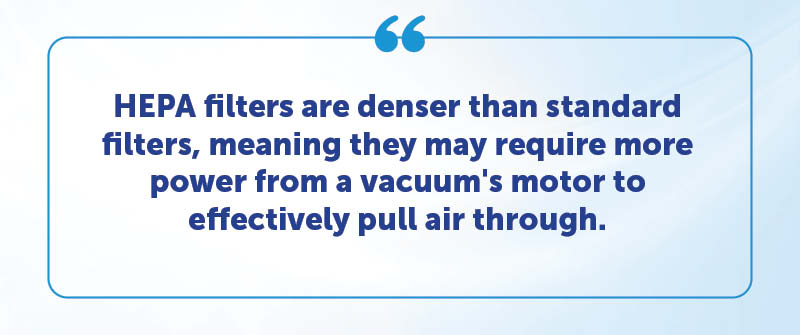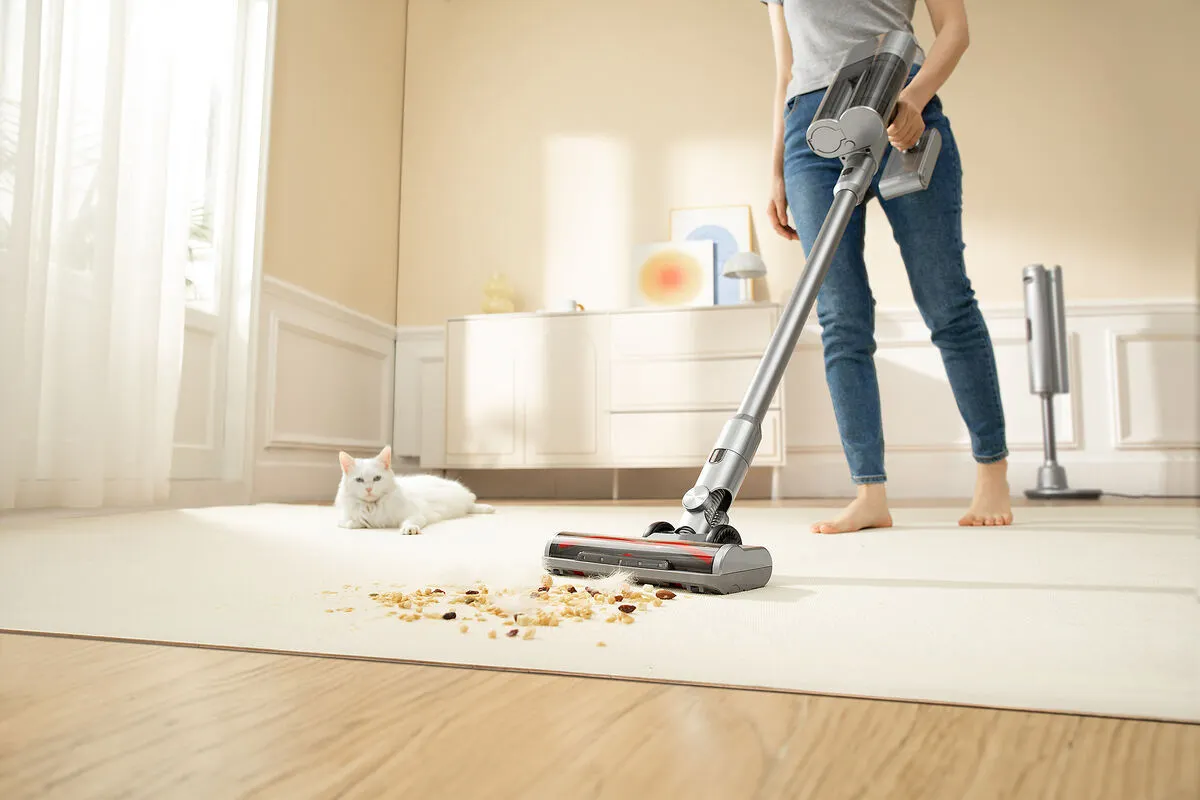Does a HEPA Filter in a Vacuum Matter?
When it comes to vacuums, the type of air filter used can significantly influence the environment in your home, especially if you or a family member suffers from allergies. Vacuum cleaner filter replacement is essential for maintaining peak performance and efficiency. HEPA filters in vacuums are highly regarded for their ability to trap smaller particles that typical filters might miss, making them an invaluable component for maintaining indoor air quality.
Importance of HEPA Filters in Allergy Management
High-efficiency particulate air (HEPA) filters are crucial in allergy management as they can capture up to 99.97% of particles as small as 0.3 microns, including pollen, dust mites, and pet dander, which are common allergens. This is particularly beneficial for those suffering from respiratory conditions, as these filters ensure that the smallest irritants are efficiently removed from your home environment.
Check out the wide range of Vacuum Cleaner Filter Replacements!
Effectiveness of HEPA Filters in Capturing Fine Particles
The effectiveness of HEPA filters isn’t just limited to allergens. They also excel in capturing tiny particles such as fine dust, smoke particles, and even some bacteria and viruses, which can contribute to a healthier living environment. This makes HEPA filter vacuums an excellent choice for anyone looking to improve their home’s air quality comprehensively.
Contribution to Indoor Air Quality Improvement
By using a vacuum with a HEPA filter, you’re taking a significant step towards enhancing your home’s indoor air quality. Cleaner air means not only reduced allergy symptoms but also a generally healthier atmosphere for all inhabitants. In environments like homes with pets or near busy roads, having a HEPA filter vacuum can make a noticeable difference in the air you breathe day-to-day. Additionally, incorporating air purifiers that are compatible with HEPA-rated vacuums can further reduce allergens and particulates, ensuring even cleaner air.
What Are The Two Disadvantages Of HEPA Filters?
Understanding the Downside of HEPA Filters
While HEPA filters are renowned for their ability to capture minuscule particles and significantly improve indoor air quality, they do come with certain disadvantages, particularly when it comes to their use in vacuum cleaners.

Impact on Vacuum Cleaner Performance
One notable drawback of using HEPA filters in vacuums is the potential impact on the performance of the vacuum cleaner itself. Due to their dense construction designed to trap particles as small as 0.3 microns, HEPA filters can impose a higher resistance to airflow. In some cases, this can lead to a decrease in the suction power of the vacuum, which might impede its ability to efficiently clean surfaces and carpets. It’s like trying to drink a thick milkshake through a straw; the denser the shake, the harder you have to suck. This phenomenon can be particularly noticeable in vacuums that weren’t originally designed to accommodate such high-efficiency filters and can affect the overall cleaning effectiveness.
Regular Maintenance and Replacement Costs
HEPA filters also require regular maintenance to function effectively. Over time, they become clogged with dust and particles, which can further restrict airflow. Hence, regular checks and cleaning (or replacing if they’re not reusable) are necessary to maintain the vacuum’s optimal performance. This brings us to another disadvantage: the costs associated with regular replacements. HEPA filters tend to be more expensive than standard filters. Frequent replacements can lead to higher ongoing costs for users. This is an important factor to consider when evaluating the long-term expense involved in maintaining a vacuum with a HEPA filter.
What Is The Difference Between A HEPA Vacuum And A Vacuum With A HEPA Filter?
Understanding the distinction between a HEPA vacuum and a vacuum equipped with a true HEPA filter can fundamentally change the way you approach indoor air quality.
Definition of a HEPA Vacuum
A HEPA vacuum is specifically designed to use HEPA filtration as its primary method for trapping particles. HEPA vacuums are constructed from the ground up to ensure that all of the air—along with the dust, dirt, and allergens—is passed through the HEPA filter before it is exhausted back into the environment. This design ensures minimal particle escape and helps maintain high indoor air quality.
Comparison with Standard Vacuums Using HEPA Filters
In contrast, a standard vacuum with a HEPA filter might not necessarily provide the same performance level. While the HEPA filter can trap small particles, the vacuum’s overall design may not prevent particle leakage outside the filtration system. This can occur because not all the air is necessarily forced through the HEPA filter, leading to reduced efficiency in trapping particles and allergens. Additionally, non-HEPA vacuum filters may not achieve the same level of filtration, which is crucial for users concerned about air quality.
Design and Purpose Differences
The main design difference lies in integration. A HEPA vacuum integrates HEPA filters within a sealed construction, preventing any air escape except through the filter. A bagged vacuum is particularly beneficial for allergy sufferers, as it reduces the spread of allergens like dust and pollen. Alternatively, vacuums that offer a HEPA filter option might need modifications or replacements to ensure complete sealing and performance.
Ultimately, the choice between a dedicated HEPA vacuum and a standard vacuum with a HEPA filter depends on your specific needs, such as allergy concerns and budget. For the highest level of particle filtration and allergen containment, investing in a HEPA vacuum might be the best approach.
Can You Put A HEPA Filter In Any Vacuum?
When considering whether you can retrofit a HEPA filter into your vacuum, it is essential to understand that not all vacuums are created equal. Compatibility hinges on a few key factors that will determine if a HEPA filter can be successfully integrated into a vacuum cleaner. For those seeking the best HEPA vacuum, exploring models specifically designed with advanced filtration capabilities and user-friendly features is highly recommended.
Factors Influencing Compatibility of HEPA Filters with Different Vacuums
The primary considerations are the design and building of the vacuum. HEPA filters are denser than standard filters, meaning they may require more power from a vacuum’s motor to effectively pull air through. Consequently, vacuum cleaners with weaker motors may struggle, resulting in reduced suction or operational inefficiencies.
Additionally, the vacuum’s size and the designated filter compartment can also pose compatibility challenges. Newer or more advanced models often come equipped with adaptable filter compartments that can render them more accommodating to HEPA filters, whereas older models may not have this flexibility.

Possible Modifications to Accommodate HEPA Filters
Modifications may be possible for some vacuum models, but they should be approached with caution. Modifications could include adjusting or replacing seals around filter compartments to ensure a snug fit and possibly upgrading the motor capacity. However, such changes can sometimes void warranties or reduce the machine’s lifespan due to unstipulated alterations.
It is important to consult with the vacuum manufacturer or refer to the product manual before making any adjustments. Some brands offer bespoke HEPA filter kits designed for their specific vacuum lineup, which can aid in achieving compatibility without the need for risky modifications.
Recommendations for Compatible Vacuums
For those determined to reap the benefits of HEPA filtration, investing in a vacuum specifically designed to house such filters may be the best option. These models are engineered to cope with the technical demands of HEPA filtration, ensuring optimal performance without the need for modifications.
HEPA-compatible vacuums are widely available and come with the added assurance of manufacturer compatibility. Brands often tout these models as ideal for households with allergy sufferers or for general improvements in indoor air quality. Pairing a HEPA-rated vacuum with a quality air purifier can further enhance allergen removal and overall air quality in the home.
Find your perfect fit at Discount Filters, where our extensive range of HEPA-compatible vacuums ensures you’ll breathe easier and live cleaner without the hassle of compatibility concerns.

